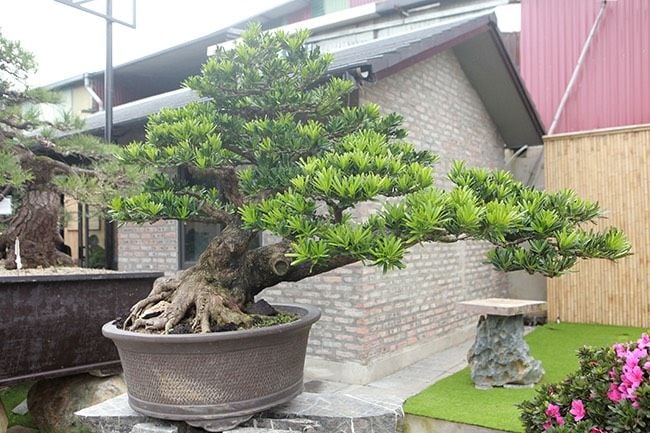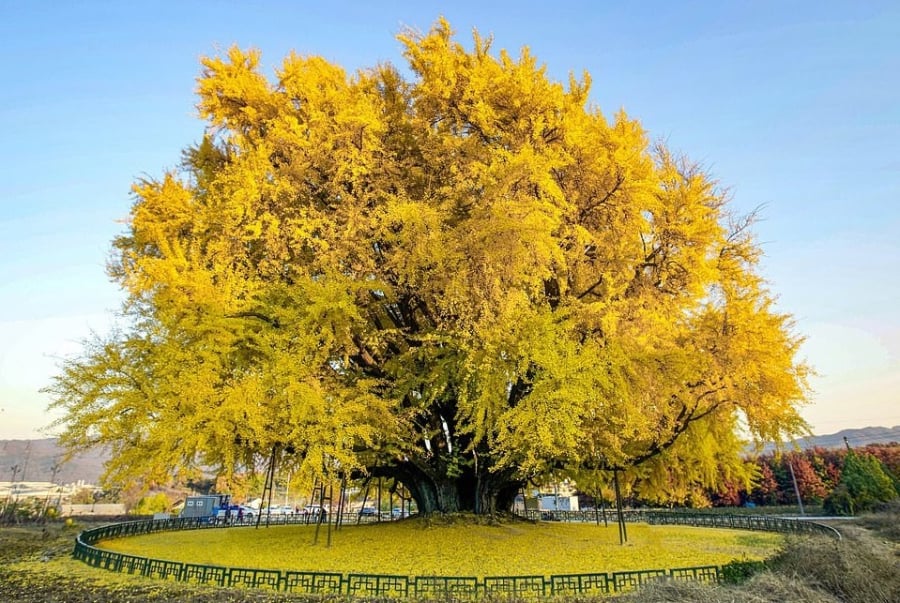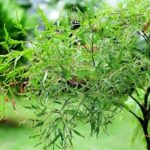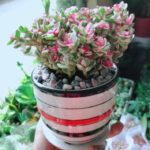In the opulent realm of the upper echelon, meticulously groomed houseplants are a common sight, serving not only as decorative pieces but also as powerful feng shui talismans. The following are the three types of houseplants often gracing the lavish villas of the affluent, revered as “gatekeepers” that attract good fortune and safeguard the well-being of the entire household.
1. La Han Pine – The Stalwart Sentinel of Longevity and Prosperity
The La Han Pine has long been emblematic of longevity, exuding a serene and steadfast aura akin to that of a mountain. While this tree grows slowly, its economic and feng shui value increases with age. This is why the La Han Pine is cherished by the elite and often takes center stage in their gardens, adorning the entrance or the front porch.

According to feng shui masters, the La Han Pine emanates positive energy and possesses the ability to safeguard wealth and protect its owners from negative influences. With its upright stature and evergreen foliage, the tree stands like a quiet guardian, instilling a sense of security in the homeowners upon their return.
A mature La Han Pine can live for centuries, passing down from generation to generation as a cherished family heirloom. Many entrepreneurs view this tree as a loyal “guardian of wealth,” believing it sustains their long-term business success.
2. Mokuhou – The Sweet-Scented Charmer that Invites Prosperity and Symbolizes Nobility and Reunion
Mokuhou, also known as Kayo in some regions, is a stunning plant with a distinctive and captivating fragrance. Mokuhou blossoms flourish in autumn, releasing a subtle yet pervasive aroma that evokes a sense of warmth and tranquility.
The affluent often plant Mokuhou in their front yards, flanking the entrance gates or lining the pathways leading to their homes. In feng shui, the scent of this tree is believed to attract wealth and auspicious opportunities while dispelling negative energies. Furthermore, the name “Mokuhou” in Chinese sounds similar to the word for “noble guest,” suggesting that the tree invites beneficial connections and good fortune.
Beyond its feng shui significance, Mokuhou also symbolizes family reunion. It is a heartwarming tradition for families to gather under the Mokuhou tree during full moon nights, indulging in moon-viewing and savoring mooncakes amidst the tree’s gentle fragrance—a beautiful custom that reinforces the importance of familial bonds.
3. Ginkgo – The Living Fossil Infusing Vitality and Long-Lasting Prosperity

Ginkgo (Ginkgo biloba) is renowned not only for its medicinal properties but also as a favored feng shui tree in luxurious gardens. Its distinctive fan-shaped leaves turn from a vibrant green in summer to a dazzling golden hue in autumn, creating a stunning “golden tree” effect right at the doorstep.
What sets Ginkgo apart is its extraordinary longevity. Some Ginkgo trees have survived for millennia, earning them the title of “living fossils” in the plant kingdom. Thus, they symbolize permanence and resilience—values that resonate with successful families in both business and life.
Feng shui practitioners believe that Ginkgo enhances vital energy, boosts wealth, and fosters stability within the family. The rounded canopy and delicately layered leaves of the tree represent the harmonious bond between family members.
Why Do the Wealthy Opt for Houseplants Over Flowers?
The allure of houseplants goes beyond their visual appeal. These “gatekeeper” plants carry a unique feng shui energy. In the cultural context of East Asia, plants in the courtyard serve as more than mere decorations; they embody the aspirations for a prosperous and peaceful life, family traditions, and abundant wealth.
The affluent understand that a beautiful garden isn’t just about vibrant flowers; it’s also about incorporating long-living, sturdy trees that symbolize the deep roots of a stable family foundation.
Even if you don’t have the means to acquire precious trees like the La Han Pine or Ginkgo, you can still choose houseplants that align with your climate and living space, such as the money tree, gold-edged silver dollar tree, or jade plant, to bring tranquility and positive energy into your home.
After all, everyone deserves a peaceful haven, and it can start with a simple potted plant by your doorstep.
The Ancestors’ Warning: “Avoid These 3 Directions for Your Stove and 3 Places for Your Bed”
The ancient practice of Feng Shui emphasizes the importance of the three directions of the stove and the three positions of the bed. These principles are believed to bring harmony and prosperity to the home. So, what are these specific directions and positions, and why are they so crucial to avoid any mishaps?
The Power of the Vietnamese Ashitaba in Feng Shui: A Symbol of Protection and Abundance in the Home
The eucalyptus tree is not only a valuable medicinal herb but also holds great significance in feng shui. With its vibrant green foliage thriving year-round, the eucalyptus tree stands as an enduring symbol of prosperity and peace in numerous Vietnamese households, believed to bring good fortune and protect the family’s wealth and well-being.
The 3 Home Features That Drain Your Fortune: Can You Guess the Second One?
In feng shui, it is believed that certain elements within the home can greatly impact the flow of energy and, subsequently, one’s fortune and prosperity. It is said that having these three large items in your home can lead to a depletion of luck and wealth, resulting in financial struggles and hardship.





































